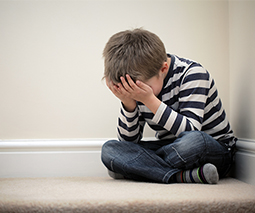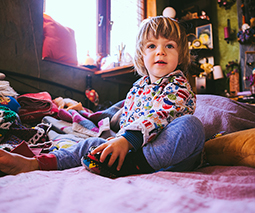How to develop a parenting strategy based on your child’s unique temperament

Babyology podcast Feed Play Love spoke to early childhood expert Naomi Hackworth from the Raising Children Network about how understanding temperament can help mums and dads fine-tune their approach to parenting.
Listen to Naomi Hackworth on Feed Play Love:
What is temperament?
“Temperament’s a set of characteristics that each of us is born with that affects how we respond to the world and how people respond to us,” Naomi says.
Every child is different and each has their own unique mix of these characteristics.
“Children’s temperaments tend to vary across certain dimensions,” Naomi explains. “So, for example, some are more reactive than others, some are more able to manage their behaviour and some are more sociable than others.”
Is temperament something we are born with?
Naomi says yes … but that our life experiences also impact temperament.
“Children are born with their temperament genetically laid down,” Naomi explains, “and those temperamental characteristics persist into adulthood.”
“Once we’re born, we do have this blueprint, but we interact with the world. We have different experiences. Our parents play a really important role in our experiences. And so we develop ways of behaving based on that temperament and our life experiences.”
What if your family has a broad range of temperaments?
Naomi told us that familial variances in temperament are very, very common.
“We often hear parents saying how different their children are from each other,” she confirms. “In a family, there can be lots of different temperaments in play, both children’s and parent’s … and sometimes they do bounce off each other.”

Temperament can also impact how a particular parent might respond to their child.
“Parents do sometimes say it’s easier to understand and care for a child that has a temperament similar to their own,” Naomi continues. That said she notes that it’s very, very normal to find parenting a child that’s temperamentally different to you tricky at times.
“If you prefer less structure in your life and you like to be more flexible, it might take a while to get used to a child who likes routine,” she explains. “Or if you are a bit shyer or less active and like quiet times and to be a bit more solitary, you might find it challenging if you have a little whirlwind on your hands, or a child that likes to be really social and spend a lot of time with friends.”

How do you determine your child’s temperament?
Parents should ask themselves questions about their child that will make their temperament blueprint a little clearer, Naomi says. For instance:
- Do they like being around other children?
- Do they like being around people or do they prefer to be a bit more solitary?
- Do they like to have new experiences and lots of noise or do they find that all a bit daunting?
- How well do they manage their own emotions?
- Do they wear their emotions on their sleeve or is it a bit more difficult to tell what they’re feeling?

How can identifying temperament help families work better?
Is there one over-arching approach when it comes to parenting and temperament? Naomi says there is.
“There’s actually no good or bad temperament,” Naomi stresses. “The important thing here is that if your child feels accepted and valued for who they are, then they’re more likely to thrive. So if you can find a way to adapt your parenting to support their individual temperament, rather than trying to get them to fit your mould, it’ll be a more supportive environment for their development.”
If parents work to create a clear picture of their child’s behavioural characteristics, then they can develop clear strategies to help kids cope with experiences that might be temperamentally challenging.
Perhaps that’s helping a boisterous child learn to settle into a quiet classroom?
Or it might be guiding a shy child through those confronting-to-them first introductions at kindergarten?
Or encouraging a gentle child who goes with the flow and lets their siblings take the reins to be a little more vocal about their own wishes.
“When [temperament] becomes problematic that’s when parenting is really important in terms of helping their child develop those strategies,” Naomi says.
Find more great stories and expert advice in the Feed Play Love podcast. Available in Apple Podcasts, Google Podcasts, Spotify or wherever you listen.









